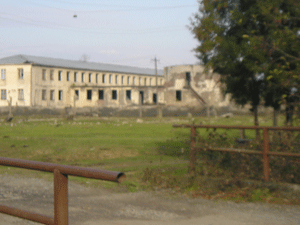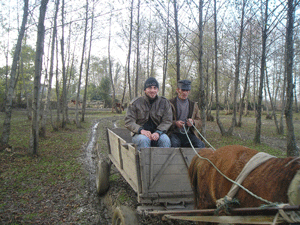 Nana Pazhava, Zugdidi
Nana Pazhava, Zugdidi
Georgian journalist personally saw the deployment and mobilization of Russian army in the village of Pichori in Gali district two days ago. Paata Lagvilava, journalist for the regional newspaper “Samgrelos Kronika” arrived in the village with the support of his relatives and despite the great risks involved, he was able to spend two days and nights in Pichori. The journalist managed to interview locals and was able to take photos of the village. Residents of Pichori complained about hard social and the political situation they face.
The Georgian journalist initially visited those Russian military bases and checkpoints that are located within Pichori village. One checkpoint has been opened in the middle of the village and is located the building of former village administration. 15 Russian troops are deployed there. A Georgian public school functions 20 meters from this checkpoint and there are nearly 150 children studying in close proximity.
Paata Lagvilava: “the number of pupils that should be attending this school is large but now the majority of them do attend school. One of the contributing factors is how a Russian checkpoint has been set up nearby and the constant fear of Russian aggression. Thus, parents do not let their children to school. Locals told me that only those pupils go to school whose parents have good relation with Russians and Abkhazian soldiers.”
Local residents explained that nobody has ordered that the teaching of the Georgian language at school be abolished. Last year, pupils who completed their studies at this school received certificates both in the Georgian and Russian language. However, the schooling process proceeds under a tense situation. There were instances, for example, when drunken Russian soldiers broke into the school and threatened children.
Russian-Abkhazian military units also broke into the houses of some locals. According to Paata Lagvilava, Russian soldiers demanded food from locals. Very often soldiers become aggressive because of being under the influence of alcohol.
Paata Lagvilava: “Russian and Abkhazian soldiers communicate with their hosts by gun-fire and not by shouting. As I was told, armed people want alcohol (they do not drink everything) and they have other complaints as well. For example, they do not take red wine and vodka. They beat one old couple because they did not have white wine to provide them with.”
Pichori residents expect additional military forces to enter their village in near future. According to the journalist, the entire Black Seaside has mined. The biggest military base with 50 people is located on the seaside. There are six vehicles and one tank there; there are six cottages and one field kitchen; the base also has several large military trucks.
According to Lagvilava, nearly 3 hectares of land is surrounded with 6-meter-deep trench. There is 60-ton container buried in the ground where they keep the heavy vehicles. There is also warehouse where they weapons before the ground.
Paata Lagvilava: “In fact Pichori is divided in two. Locals cannot travel across the military base located in the middle of the village. Locals cannot take their cattle to pastures either. I personally witnessed one fact. We approached Russians together with my friend who was dressed in rags. We pretended we want sand for the construction but they did not allow us to go to another part of the military base. At that moment, locals urged soldiers to let them take cattle to pastures but Russians did not allow this; a subsequent argument broke out between locals and soldiers, which ended with strict warning and threats of them being shot.
Residents of Pichori cannot move about and transport things freely. They have to walk to the administrative board that is located in Zugdidi, a district of 10 kilometers. It is sometimes possible – on better occasion, to be able to travel by horses. The most difficult is their situation when people have to take luggage; people have to sell their products and here they continue to face problems.
sometimes possible – on better occasion, to be able to travel by horses. The most difficult is their situation when people have to take luggage; people have to sell their products and here they continue to face problems.
Paata Lagvilava: “Villagers can hardly manage to take products to the village of Ganmukhuri. It is very risky to take goods to Gali for sale. Abkhazians have established high custom taxes for transporting hazelnuts, kiwi, and other fruits. There is also the constant fear that the Abkhazians might seize all their money from the villagers when they make their way home.... Before August war bus was running from Pichori to Zugdidi and living conditions of locals was much more stable.”
Consequently, the residents of Pichori village have urged the Georgian authority to assist them in someway. They have also turned to international organizations to exert some influence on the Russian soldiers to allow them to be able to freely travel back and forth. Paata Lagvilava stated that villagers feel themselves to be treated as if they were slaves. Abkhazian people take residents of Pichori to Kokhora, Achigvara and other villages to pick citruses. Georgians in effect have to provide free labor to Abkhazian families.
To add injury to insult, the residents of Pichori expect that soon there will be a mass issuance of Abkhazian passports to them; the process of having passports forced upon them is expected to start in January 2009.
Paata Lagvilava: “The pasportization process has almost ended in Abkhazian territory. Only Gali district population has not been provided Abkhazian passports. Georgian governor of the district, who was appointed by Abkhazians, is in charge of resolving this problem. The Georgian governor distributes pension of 200 Russian rubles (11 GEL) to people. Pichori residents told me that they have to accept Abkhazian nationality and passports because Georgian authority does not offer them a better alternative. If locals do not accept Abkhazian nationality, they may be even kicked out from their houses. Unfortunately, nobody will provide alternative accommodation to them in Georgia. Residents of Pichori hope Georgian people will not condemn them for their decision.”
Residents of Pichori speak about their hopeless situation during their interview with the Georgian journalist. Things have changed for them over time. Before the Georgian-Russian war in August they still believed in Mikheil Saakashvili and hoped that they would live within an integrated Georgia. However, things are different in the aftermath, now it is only long-time perspective for them. Locals state that Georgian authority does not much care about the population of Gali district. They call upon Georgian journalists to be impartial in their work because of provocations and the way that false and misleading information has created serious problems for Georgians who continue to reside in Abkhazian territory.



